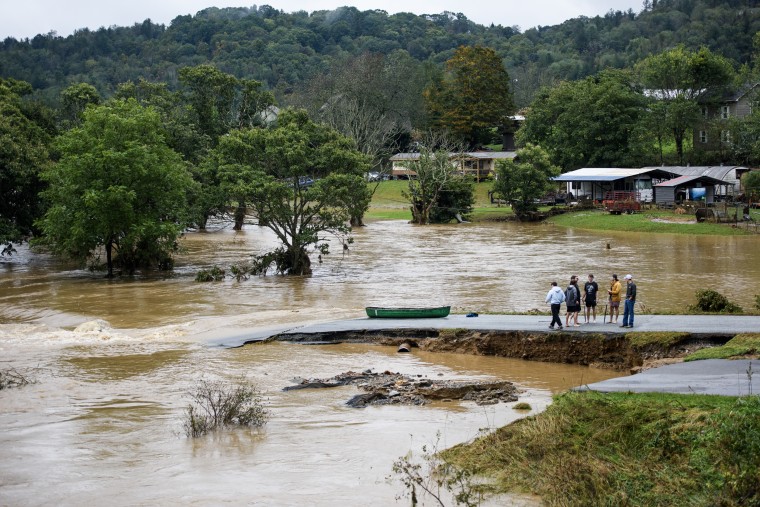Hurricane Helene ravaged western North Carolina this weekend, leaving a trail of death and destruction. At least 44 people were killed across the state, most in a mountainous region where the storm caused monstrous flooding, inundating homes, destroying businesses and cutting power to thousands.
North Carolina emergency responders raced Monday to deliver water, food and other essential supplies to areas hit hard by Helene. Hundreds of people are still missing and more than 450,000 customers are without power, according to the website Poweroutage.us.
“This is an unprecedented tragedy that requires an unprecedented response,” said Governor Roy Cooper said during a news briefing on Sunday, adding that some areas were drenched with as much as 29 inches of rain.
To follow here for live coverage.
At least 35 people have been killed in Buncombe County, home to the booming mountain city of Asheville, according to law enforcement officials. Asheville, a mecca for artists and a popular tourist destination, found itself isolated by the storm’s effects: electricity and cell service were cut off; roads and bridges in ruins; cars and trucks underwater.
Mark Goldthwaite, the owner of the Asheville Guitar Bar, said he feared his business would essentially be destroyed. “It’s not just months of recovery,” he told NBC affiliate WRAL. “It’s been years.”
While people in Asheville are reckoning with the devastation, others in remote areas have yet to be located as first responders struggle to access areas isolated by washed-out roads. The loss of communication has left relatives of missing locals panicking and pleading for scraps of information.
Buncombe County Sheriff Quentin Miller, who described the storm’s chaotic aftermath as a “historic event,” acknowledged that some officials were blinded by the sheer intensity of Helene, which also hit parts of Florida, Georgia and South Carolina.
“I don’t know if we can ever properly prepare for everything. This was new to all of us. This puts us in places we didn’t know before,” Miller said. “To say this caught us off guard would be an understatement.”
Helene made landfall in the Big Bend region of Florida late Thursday as a Category 4 hurricane with winds of 140 mph (230 km per hour), leaving many in that area picking up the pieces again after another devastating hurricane. Much less common is for a weather event like Helene to hit the mountains of Appalachia — an area hours from the coast where residents are not used to disastrous hurricane-related weather.
Photos and videos from Asheville, home to some 95,000 people, captured harrowing scenes and showed neighborhoods rendered unrecognizable by Helene’s influence.

Houses have been swept away. Refrigerators and other appliances float in the mud. Restaurants and coffee shops were smashed to pieces. Dazed locals wander through streets full of rubble. Residents survey the damage as they paddle in kayaks through murky brown water past flooded roofs.
The historic village of Biltmore, a popular attraction at the entrance to the Biltmore mansion, was submerged underwater. Built during the first Gilded Age, the estate regularly attracts large numbers of visitors.
In an interview on NBC’s TODAY early Monday, Buncombe County’s communications director described the shock of returning to her own home the night before.
“I went home last night for the first time since the storm and I live in Black Mountain, and to say it was decimated would be an understatement,” Lillian Govus said. “Roads are so impassable… so we have to fly in equipment and take other routes.”
President Joe Biden, who called the storm’s impact “stunning,” vowed to visit the area this week as long as he does not hinder recovery and rescue efforts.
“Your nation stands with you and the Biden-Harris administration will be there until the job is done,” he said from the White House on Monday.
Biden added that he may call a special session of Congress to address the hurricane’s devastation, but that “no decisions have been made yet.”
The storm, weakened but still terrifying, swept through Georgia and then flooded the Carolinas and Tennessee with heavy rains. Weather-related deaths totaled more than 100 people in the Southeast, including at least 12 in Florida, at least 17 in Georgia, at least 25 in South Carolina and at least four in Tennessee, according to an NBC News count based on figures from local sources. civil servants.
The approximately 44 deaths in North Carolina represent a third of all fatalities from the storm.
Jessica Drye Turner took to Facebook Friday to plead for someone to rescue four of her family members who were stranded on the roof of their Asheville home.
“They watch eighteen wheelers and cars drift by,” she wrote.
But before help could arrive, the roof collapsed. Turner said in a subsequent Facebook post on Saturday that her elderly parents and 6-year-old nephew had drowned.
“I have never felt such loss, devastation and pain in my spirit,” she wrote.


